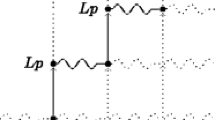Abstract
For constructive (intuitionistic) predicate calculus without functional symbols and equality a complete description is derived, in terms of prefixes and signatures, of reduction classes and of classes of pseudoprenex formulas, i.e., formulas representable in form
, where
is a quantifier-free formula and is a finite sequence of quantifier complexes and expressions ⌈⌈. The operation
plays a fundamental role in the construction of solvable classes. From any pseudoprenex formulaA this operation constructs, preserving signature, a formula list Г such thatA is decidable in the constructive calculus if and only if some formula from Г is decidable in classical calculus. In the paper conditions are formulated sufficient for the carrying out of quantifier ∀ from a disjunction and the permutations of quantifiers ∀ and ∃ to preserve decidability in the constructive calculus. A signature-preserving method for the elimination of positive occurrences of equality is described as well. This method and the conditions mentioned play an important role in the construction of reduction classes. Also examined is the problem of recognition of refutability of pseudoprenex formulas on completely finite Kripke models, i.e., on those Kripke models in which both the set of “time instants” and also the union of objective domains are finite. A complete description in terms of prefixes and signatures is given for classes of pseudoprenex formulas for which the problem of recognition of refutability on completely finite Kripke models is solvable. This description differs essentially from the description of solvable pseudoprenex formulas for constructive predicate calculus.
Similar content being viewed by others
Literature cited
K. Gödel, “Zum Entscheidungsproblem des logischen Funktionenkalkuls,” Mona tsh. Math. Phys.,40, 433–443 (1933).
S. A. Kripke, “Semantical analysis of intuitionistic logic. 1,” in: Formal Systems and Recursive Functions, North-Holland, Amsterdam (1965), pp. 92–130.
K. Schütte, Vollständige Systeme modaler und intuitionistischer Logik, Springer-Verlag, Berlin-New York-Heidelberg (1968).
V. P. Orevkov, “Unsolvability in constructive predicate calculus of a class of formulas of type ⌉⌉ ∀∃,” Dokl. Akad. Nauk SSSR,163, No. 3, 581–583 (1965).
V. P. Orevkov, “Decidable classes of binary negations of prenex formulas,” Third All-Union Conf. Math. Logic (Repts. Abstrs.) [in Russian], Novosibirsk (1974), pp. 164–165.
S. C. Kleene, Introduction to Metamathematics, North-Holland Elsevier, Amsterdam (1971).
S. C. Kleene, Mathematical Logic, Wiley, New York (1967).
V. P. Orevkov, “Glivenko classes of sequents,” Tr. Mat. Inst. Akad. Nauk SSSR,98, 131–154 (1968).
H. B. Curry, Foundation of Mathematical Logic, McGraw-Hill, New York (1963).
G. E. Mints, “The Skolem method in intuitionistic calculi,” Tr. Mat. Inst. Akad. Nauk SSSR,121, 67–99 (1972).
G. Gentzen, “Untersuchengen uber das logische Schliessen,” Math. Z.,39, 176–210 and 405–443 (1934).
G. E. Mints and V. P. Orevkov, “Generalizations of the theorems of Glivenko and Kreisel to one class of predicate calculus formulas,” Dokl. Akad. Nauk SSSR,152, No. 3, 553–554 (1963).
C. Cellucci, “Un'osservazione sul teorema di Mine-Orevkov,” Boll. Unione Mat. Ital.,2, No. 1, 1–8 (1969).
S. C. Kleene, “Permutability of inferences in Gentzen's calculi LK and LJ,” Mem. Am. Math. Soc., No. 10, 1–26 (1952).
A. Church, Introduction to Mathematical Logic, Vol. 1, Princeton Univ. Press, Princeton, New Jersey (1956).
W. Ackermann, Solvable Cases of the Decision Problem, North-Holland, Amsterdam (1968).
M. G. Rogava, “Sequential versions of applied predicate calculus without structural deduction rules,” Tr. Mat. Inst. Akad. Nauk SSSR,121, 136–164 (1972).
V. P. Orevkov, “Nonlengthening applications of the rules for equality,” Zap. Nauch. Sem. Leningrad. Otd. Mat. Inst. Akad. Nauk SSSR,16, 152–156 (1969).
Yu. Sh. Gurevich, “On the effective recognition of derivability of formulas of the restricted predicate calculus,” Algebra i Logika,5, No. 2, 25–55 (1966).
H. Wang, “Dominoes and the AEA case of the decision problem,” Proc. Sympos. Math. Theory Automata, Brooklyn Polytechnic Press, New York (1963), pp. 23–55.
Yu. Sh. Gurevich, “An existential interpretation,” Algebra i Logika,4, 71–85 (1965).
V. F. Kostyrko, “On the ∀∃n∀ reduction class,” Algebra i Logika,3, No. 5–6, 45–55 (1964).
A. A. Markov, “On constructive mathematics,” Tr. Mat. Inst. Akad. Nauk SSSR,67, 8–14 (1962).
B. A. Trakhtenbrot, “The impossibility of an algorithm for the decision problem for finite domains,” Dokl. Akad. Nauk SSSR,70, No. 4, 569–572 (1950).
A. I. Mal'tsev, Algorithms and Recursive Functions [in Russian], Nauka, Moscow (1965).
Additional information
Translated from Zapiski Nauchnykh Seminarov Leningradskogo Otdeleniya Matematicheskogo Instituta im. V. A. Steklova Akad. Nauk SSSR, Vol. 60, pp. 109–170, 1976. Results announced October 2, 1975.
Rights and permissions
About this article
Cite this article
Orevkov, V.P. Solvable classes of pseudoprenex formulas. J Math Sci 14, 1497–1538 (1980). https://doi.org/10.1007/BF01693983
Issue Date:
DOI: https://doi.org/10.1007/BF01693983




